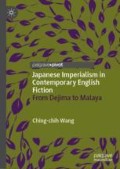Abstract
This chapter interrogates the strategies of remembering and forgetting traumatic memories of Japanese occupation described in Tan’s The Garden of Evening Mists. It also examines how the female protagonist Teoh Yun Ling remembers her days spent in a secret Japanese prison camp when she is losing herself to dementia. Tan borrows from the techniques of building a Japanese garden, shakkei, to demonstrate how the heroine borrows language from flowers to recount her culpable past. When Yun Ling comes to realize that her Yugiri is not just a haven but also trauma in disguise and the inscription of the legacy of Japanese imperialism, she will soon recuperate from the suffering caused by her traumatic memories and regain what she has lost in the act of violence.
Access this chapter
Tax calculation will be finalised at checkout
Purchases are for personal use only
Notes
- 1.
Herein this paper, I follow Yun Ling’s claim that “family must come first” and put the family names of East Asian characters before their given names. As she points out in the beginning of her memoir, a surname surpasses a given name because it is always the welfare of the family, not the personal interests of an individual member that one should seek and cherish. Being “Straits Chinese” speaking mainly English at home, Yun Ling was taught this way and therefore she “never changed the order of [her] name, not even when [she] studied in England.” Nor had she “taken on an English name just to make it easier for anyone” (Tan 28) to tell who she is and what role she plays in the war. Likewise, the Japanese names are preceded by the family name which is the style used in this paper, for example, Nakamura Aritomo rather than Aritomo Nakamura, which is the reverse way of Western practice.
- 2.
I am indebted to Richard J. McNally’s Remembering Trauma for clarifying the usages of victim and survivor. According to McNally, “individuals who have experienced terrible events” would traditionally be termed as victims, implying that “those exposed to rape, earthquakes, child abuse, and so forth are not to blame for their misfortunes.” More significantly, victims are inclined to “direct attention to perpetrators and to the damage they have inflicted on others.” When grappling with politics of trauma, however, some other critics prefer the term survivor to victim on account that survivor entails “resilience and strength in overcoming adversity,” so the term survivor “should be reserved for those who have undergone life-threatening traumatic events, such as combat, serious earthquakes, or confinement in concentration camps” (2). McNally in his book uses both victim and survivor to “denote anyone who has been exposed to traumatic events, including events that were not life-threatening” (2–3). In this chapter, I opt to use victim in a more general way to refer to one who has experienced traumatic events and is independent of his misfortunes. For one who once suffered for “life-threatening traumatic events” but demonstrates considerable “resilience and strength in overcoming adversity,” I call him survivor to assert that it is the untellable victimization of the survivor that makes his politics of remembering trauma different from that of the victim’s.
- 3.
The comfort woman policy is one of the war atrocities Japan enacted in Asia during World War II. According to the report presented by the Northeast Asian History Foundation, innumerable women from Korea to Indonesia and elsewhere including Netherlands and England were forced to service Japanese soldiers who were demented either from the brutal combats or from the Japanese army’s imperious discipline (10–11, 33). Those women were mostly illiterate, while daughters of the landlord class and local officials were spared from enforced prostitution because the Japanese imperialist government needed their families to help control the local people (Hicks 26–27). Henceforth, women from lower classes were coerced into playing “suitable volunteers” by the kempeitai, the Japanese military police, in achieving Japan’s “inevitable victory” (Hicks 26). The peasant girls with limited ability to read or write were very often induced by a promise of special training to enter the “Women’s Voluntary Service Corps,” according to George Hicks. Unfortunately, such a promise was eventually turned into enforced prostitution. Even after they had managed to survive from the brutal war, many of them became infertile and consequently isolated from the society when many others were psychologically traumatized and unable to build normal relationships with common people (Hicks 226–28). Concealing the fact that they were once Japanese military “comfort women,” they had to endure pain and poverty and even passed away without receiving proper apologies or fair compensation (Northeast Asian History Foundation 50).
- 4.
I have discussed Sigmud Freud’s “the return of the repressed” in my book analyzing Kazuo Ishiguro’s first six novels (Wang, Homeless Strangers 17–23).
- 5.
The heroine’s given name, Yun Ling, means “Cloud Forest,” she told Aritomo in their first encounter at Yugiri in 1951 after the country’s name had changed into Malaysia (Tan 46). Upon hearing Yun Ling’s explanation, Aritomo pays his compliment and says: “A beautiful name. In Japanese you would be called—.” With no hesitation, Yun Ling interrupts him and replies: “I know what I’d be called” (Tan 46). Tominaga had told her years ago in the internment camp.
- 6.
I have elsewhere analyzed Aritomo’s role in the Golden Lily plan (Wang 10–12).
Author information
Authors and Affiliations
Rights and permissions
Copyright information
© 2019 The Author(s)
About this chapter
Cite this chapter
Wang, Cc. (2019). Inscribing the Legacy of Japanese Imperialism in The Garden of Evening Mists. In: Japanese Imperialism in Contemporary English Fiction. Palgrave Pivot, Singapore. https://doi.org/10.1007/978-981-15-0462-4_4
Download citation
DOI: https://doi.org/10.1007/978-981-15-0462-4_4
Published:
Publisher Name: Palgrave Pivot, Singapore
Print ISBN: 978-981-15-0461-7
Online ISBN: 978-981-15-0462-4
eBook Packages: Literature, Cultural and Media StudiesLiterature, Cultural and Media Studies (R0)

